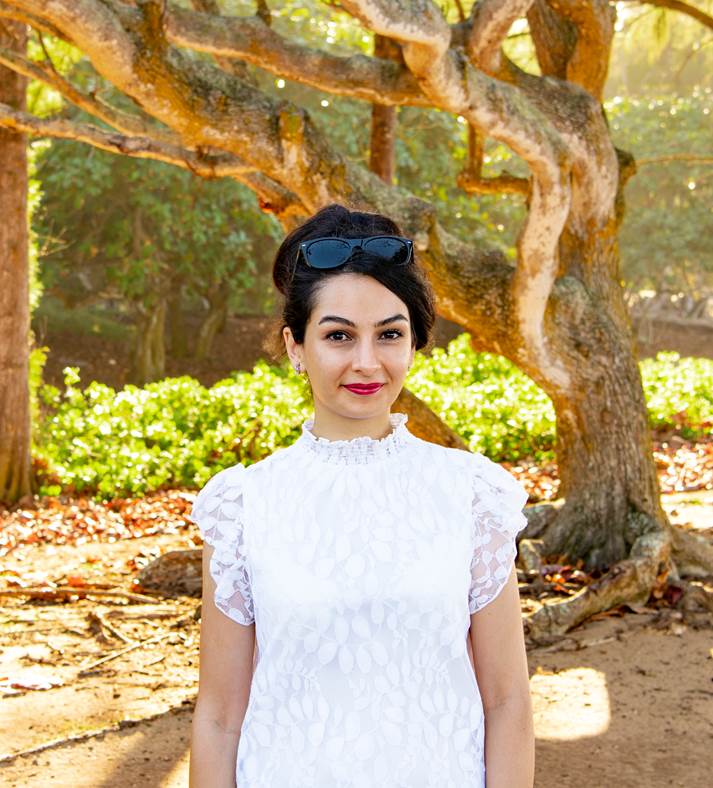News | Spotlight on U Hawaii PhD Farnaz Kaviari
Stop the VideoNews

Spotlight on U Hawaii PhD Farnaz Kaviari
Tuesday, December 7, 2021
by Alejandra Reyes, USC Construction Engineering and Management
Meet Farnaz Kaviari, PhD student at the University of Hawaii at Manoa. Farnaz was born and raised in Iran and has centered her studies around civil engineering and urban planning. Farnaz has achieved multiple awards throughout her educational path and was given the honor of receiving three years of a full assistantship from the Department of Urban and Regional Planning at the University of Hawaii at Manoa. She was also ranked 30th among over 2,000 participants in Iranian National University Entrance M.S.c Exam in 2013 and was ranked top 5% in the same sector in 2008.

Farnaz Kaviari, PhD student, University of Hawaii at Manoa
“I have been interested in location-based data since I was in high school,” Farnaz shares. “My interest in location-based data led me to pursue the Civil Engineering-Surveying Program in my undergraduate education. In my B.Sc., I learned different techniques regarding geospatial data collection methods, such as surveying, photogrammetry, remote sensing, and GPS.”
After earning her bachelor’s degree in Civil Engineering at Zanjan National University, Farnaz completed her master’s degree in Civil Engineering / Geospatial Information System at the K.N. Toosi University of Technology. “I completed my first master's degree in the field of GIS, and during my studies, I had great opportunities to learn more in the field of data management, programming, agent-based and dynamic modeling, transportation, and artificial intelligence.” Farnaz explains. In her master’s level studies there she came to the realization that GIS encompasses interdisciplinary applications that could be used in many different fields and discovered an interest in utilizing GIS to represent, stimulate, and solve issues involved with urban planning, transportation, and disaster management. Farnaz furthered her education by pursuing a second master’s degree, this time at the University of Hawaii at Manoa, where she still studies today.
“My interest in the interdisciplinary nature of GIS led me to start my second master's in the field of Urban and Regional Planning at the University of Hawaii at Manoa. During this program, I used GIS, agent-based modeling, and programming to solve location-based problems in various fields, such as disaster management, transportation, and urban planning. I developed an agent-based model to simulate the evacuation process for a catastrophic tsunami event in Waikiki, Hawaii. In this simulation, I modeled the evacuee's movements and transportation capacities to estimate clearance time and at-risk population.”
Now a doctoral student, Farnaz’ “research focuses on simulating the spread and containment of COVID-19 in an urban resort district with agent-based modeling,” she notes. While there, Farnaz has earned the respect of faculty, staff, and her peers. “In working with Ms. Kaviari, I found that she is very passionate about her research and publishing,” noted Eric Yamashita, Associate Director for Technology and Innovation, National Disaster Preparedness Training Center (NDPTC), University of Hawaii at Manoa. “I find it a pleasure to work with such students who really take an interest in research and publication.”
Farnaz is interested in modeling the real-word phenomena that aids to improve the overall quality of living and finds that transportation is an important field that affects virtually all aspects of daily life. “Transportation not only plays an essential role in people's daily lives, economy, and communication, but it also has a crucial influence on disaster evacuation and the spread of infectious diseases,” she says.
In the future, Farnaz hopes to expand her knowledge to improve the overall quality of human life. She is currently conducting research in which she works on modeling the transportation network and human behavior to calculate the result of distinct events and disruptions such as the COVID-19 pandemic. The simulations under different events would in turn help make the community more resistant to sudden events which is her ultimate goal in the future.
Throughout her time in Hawaii, Farnaz says she particularly appreciates the opportunity to embrace a peaceful and unique environment with nice weather patterns. She enjoys living in Hawaii as she studies as she is both learning to integrate systems for a better future while doing things she loves such as swimming, camping, hiking, and more.
About the Author:
Alejandra Reyes is an undergraduate student attending the University of Southern California studying Civil Engineering with an emphasis in Construction Engineering and Management. She currently writes for the METRANS newsletter and is also an active member of the METRANS Toastmasters Club.
News Archive
- December (1)
- November (6)
- October (4)
- September (2)
- August (3)
- July (4)
- June (3)
- May (7)
- April (8)
- March (11)
- February (8)
- January (7)
- December (7)
- November (8)
- October (11)
- September (11)
- August (4)
- July (10)
- June (9)
- May (2)
- April (12)
- March (8)
- February (7)
- January (11)
- December (11)
- November (5)
- October (16)
- September (7)
- August (5)
- July (13)
- June (5)
- May (5)
- April (7)
- March (5)
- February (3)
- January (4)
- December (4)
- November (5)
- October (5)
- September (4)
- August (4)
- July (6)
- June (8)
- May (4)
- April (6)
- March (6)
- February (7)
- January (7)
- December (8)
- November (8)
- October (8)
- September (15)
- August (5)
- July (6)
- June (7)
- May (5)
- April (8)
- March (7)
- February (10)
- January (12)















